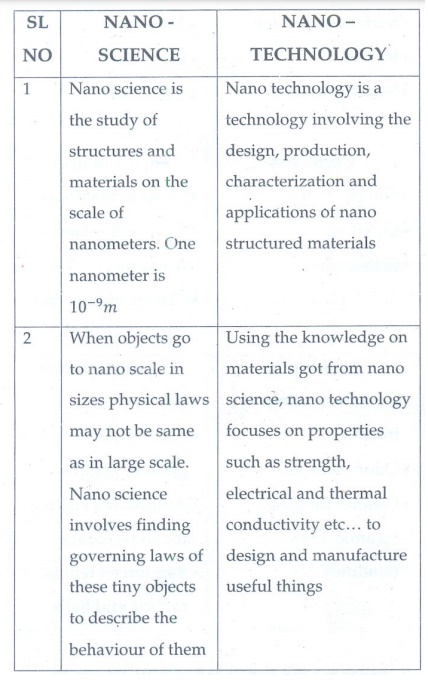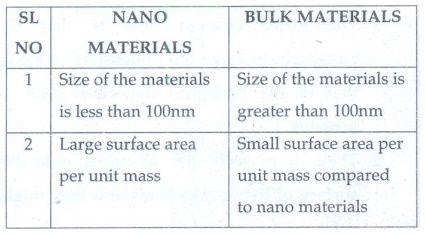Recent Developments in Physics - Short answers | 12th Physics : UNIT 11 : Recent Developments in Physics
Chapter: 12th Physics : UNIT 11 : Recent Developments in Physics
Short answers
Short answers
1. Distinguish between Nanoscience and Nanotechnology.

NANO- SCIENCE
1.
Nano science is the study of structures and materials on the scale of nanometers.
One nanometer is 10-9m
2.
When objects go to nano scale in sizes physical laws may not be same as in
large scale. Nano science involves finding governing laws of these tiny objects
to describe the behaviour of them
NANO- TECHNOLOGY
1.
Nano technology is a technology involving the design, production, characterization
and applications of nano structured materials
2.
Using the knowledge on materials got from nano science, nano technology focuses
on properties such as strength, electrical and thermal conductivity etc... to design
and manufacture useful things
2. What is the difference between Nano materials and Bulk materials?

NANO MATERIALS
1.
Size of the materials is less than l00 nm
2.
Large surface area per unit mass
BULK MATERIALS
1.
Size of the materials is greater than 100 nm
2.
Small surface area per unit mass compared to nano materials
3. Give any two examples for “Nano” in nature.
❖ Peacock Feathers
❖ Lotus leaf surface
❖ Scales on the wings of a morph
butterfly.
4. Mention any two advantages and disadvantages of Robotics.
Advantages of Robotics:
❖ Much cheaper than humans
❖ Stronger and faster than humans
Disadvantages of Robotics:
❖ They have no sense of emotions
or conscience
❖ Unemployment problem will
increase
5. Why steel is preferred in making Robots?
Robot
bodies are made using sheet, bar, rod and other shapes with steel because the
steel is several times stronger than aluminium.
6. What are black holes?
Black
holes are end stage of stars which are highly dense massive objects. Its mass
ranges from 20 times to 1 million times mass of the sun.
It
has very strong gravitational force such that any particle or even light can
not escape from it.
Every
galaxy has black hole at its centre.
7. What are sub atomic particles?
The
particles which are present inside the nucleus of an atom and electrons
surrounding the nucleus are called subatomic particles.
Eg:
Proton, Neutron, Electron
Some other subatomic particles are Quark, gluons, Higgs particles.
Related Topics